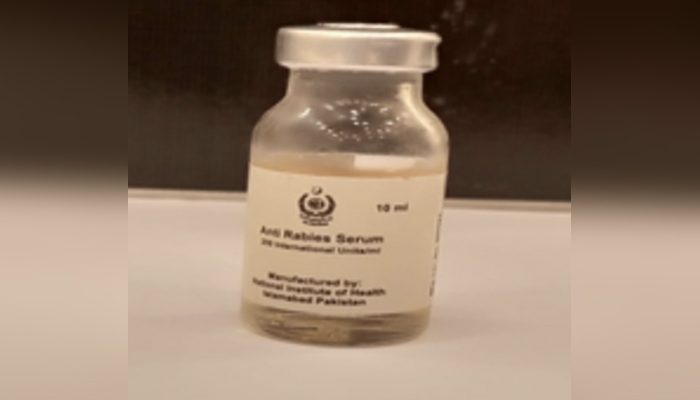District health authority arranges sufficient quantity of vaccines
Rawalpindi:The District Health Authority has claimed to have arranged sufficient quantity of anti-snake venom serum (ASV), anti-rabies vaccine and anti-rabies immunoglobulin (RIG) in all tehsil headquarters hospitals and rural health centres operating under DHA to cater to the needs of victims in rural areas of the district during monsoon.
It is important to mention that the healthcare facilities in this region of the world, in the sub-continent, witness the heaviest influx of snakebites during the monsoon, while in Pakistan, most of the cases of snakebites are reported from peripheries. Anti-snake venom serum is considered as the only treatment for the snakebites.
All THQ hospitals located in Gujar Khan, Taxila, Kahuta, Kallar Syedan, Kotli Satyan and Murree and RHCs located in Rawalpindi, Chauntra, Baga Sheikhan, Mandra, Qazian, Lehtrar, Phagwari and Doltala serving under district health authority have sufficient quantity ofASV, claimed Chief Executive Officer District Health Authority Rawalpindi Dr. Asif Arbab Khan Niazi when contacted by ‘The News’ on Sunday.
He added that the district health authority has arranged ASV before the setting in of monsoon taking the matter highly serious for the lives of victims particularly in rural areas. He said that along with ASV, the health department has also arranged sufficient quantities of anti-rabies vaccine and anti-rabies immunoglobulin (RIG) for the THQ hospitals and RHCs.
Anti-snake venom vaccine, called antivenin, is a serum with antibodies that combat snake venom. The injection of antivenin is the only drug treatment available for snakebites that is administered to victims displaying life-threatening signs and symptoms. National Institute of Health (NIH), Islamabad is the only producer of this vaccine here.
Rabies, a severe viral disease, is caused by a virus carried in the saliva of infected animals. It is fatal if not treated properly. It affects the central nervous systems of most warm-blooded animals and victims of such animal bites have to be immediately vaccinated. After exposure to the disease, the victim’s survival is almost impossible.
In the case of a rabid animal bite case, a dog in Pakistan, the virus spreads from the injured part to the nerves and on to the spinal cord that damaging the victim's brain ultimately results in death. It causes convulsions, inability to move and strange behaviour developing hydrophobia (an extremely intense aversion to water, especially the fear of drinking water or other liquids) in the victim exposed to the disease. Dr. Asif Niazi said that his office has been following a proper monitoring system and in case of shortage of ASV or ARV, his office and the Punjab health department would be notified immediately. He said the healthcare facilities working under his office have a sufficient number of doses of ASV for treatment of snakebites along with sufficient doses of ARV to provide treatment to victims of dog-bite. It is, however, important that the teaching hospitals in Rawalpindi have been frequently receiving patients in need of ASV and ARV from the peripheries.
-
 Ariana Grande Opens Up About ‘dark’ PTSD Experience
Ariana Grande Opens Up About ‘dark’ PTSD Experience -
 Angelina Jolie Says It Loud: 'Scars Define My Life'
Angelina Jolie Says It Loud: 'Scars Define My Life' -
 Climate-driven Wildfires Scorch Some Of World’s Oldest Trees In Patagonia
Climate-driven Wildfires Scorch Some Of World’s Oldest Trees In Patagonia -
 King Charles’ Ignorance Over Andrew & Jeffrey Epstein Not True? Foreign Office, MI6’s Work Comes Out
King Charles’ Ignorance Over Andrew & Jeffrey Epstein Not True? Foreign Office, MI6’s Work Comes Out -
 Police Detained 'innocent' Man In Nancy Guthrie's Kidnapping
Police Detained 'innocent' Man In Nancy Guthrie's Kidnapping -
 Co-founders Of Elon Musk's XAI Resigned: Here's Why
Co-founders Of Elon Musk's XAI Resigned: Here's Why -
 Dakota Johnson Reveals Smoking Habits, The Leading Cause Of Lung Cancer
Dakota Johnson Reveals Smoking Habits, The Leading Cause Of Lung Cancer -
 FAA Shuts Down El Paso Airport, Flights Suspended For 10 Days: Here’s Why
FAA Shuts Down El Paso Airport, Flights Suspended For 10 Days: Here’s Why -
 Kate Middleton, Prince William's Major Plan Revealed After Statement On Andrew Scandal
Kate Middleton, Prince William's Major Plan Revealed After Statement On Andrew Scandal -
 Teacher Abused Children Worldwide For 55 Years, Kept USB Log Of Assaults
Teacher Abused Children Worldwide For 55 Years, Kept USB Log Of Assaults -
 Nick Jonas Set To Showcase Acting Skills In Upcoming Thriller 'Bodyman'
Nick Jonas Set To Showcase Acting Skills In Upcoming Thriller 'Bodyman' -
 Milano-Cortina 2026: Assessing Italy’s Winter Olympics Economic Growth
Milano-Cortina 2026: Assessing Italy’s Winter Olympics Economic Growth -
 Chris, Liam Hemsworth Support Their Father Post Alzheimer’s Diagnosis
Chris, Liam Hemsworth Support Their Father Post Alzheimer’s Diagnosis -
 Savannah Guthrie Expresses Fresh Hope As Person Detained For Questioning Over Kidnapping Of Nancy
Savannah Guthrie Expresses Fresh Hope As Person Detained For Questioning Over Kidnapping Of Nancy -
 ByteDance Suspends Viral Seedance 2.0 Photo-to-voice Feature: Here’s Why
ByteDance Suspends Viral Seedance 2.0 Photo-to-voice Feature: Here’s Why -
 Tom Hanks Diabetes 2 Management Strategy Laid Bare
Tom Hanks Diabetes 2 Management Strategy Laid Bare




